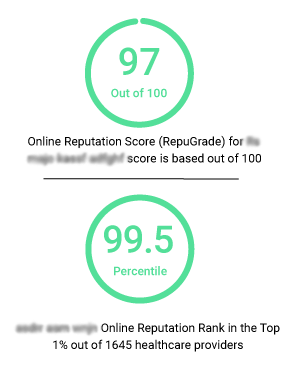Why Dental Care Practices Need to Manage Their Online Reputation
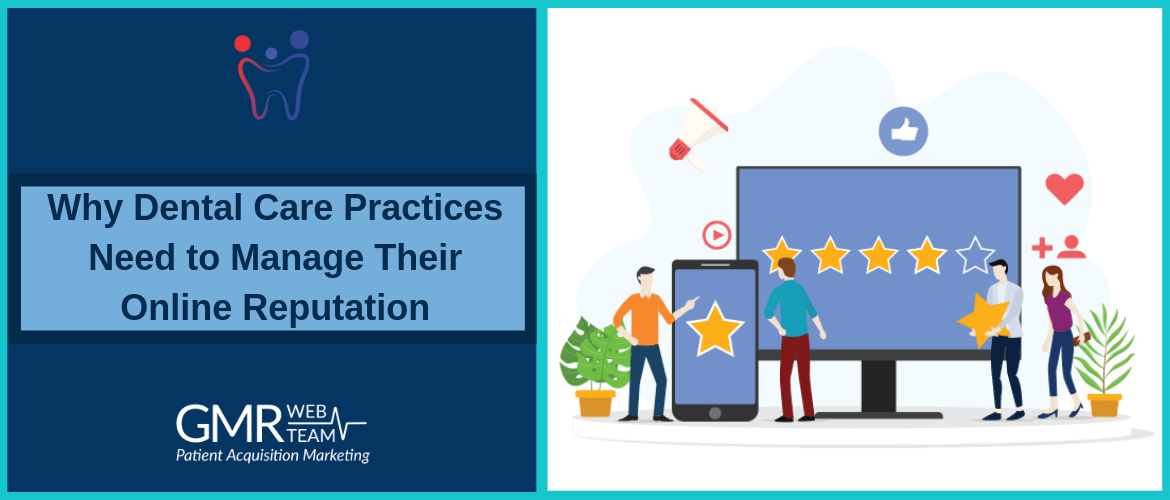
In times when online reviews are playing a decisive role in customers' decision making, healthcare providers cannot just sit back with folded hands, and let the online reviews freely shape the public image and opinion about their practice. Not contributing with your inputs as a provider can give rise to the polarity of thoughts on review websites, which can lead to a situation where your prospective patients aren’t able to get the actual picture of patient satisfaction for your practice. What providers should do is take some responsibility, and manage (without interfering with the point of view or the originality of reviews) how these reviews flow onto the important review websites. This kind of information input from the providers' side will greatly contribute to the role and value of review sites in reflecting the true picture of patient satisfaction (to the patients) about their practices. This will also be a win-win for everyone: patients, providers, and the review websites. How? See below:
- True reflection of the patient satisfaction for providers or practices will increase the credibility of review websites
- Increased credibility of the review websites will help patients in their decision making
- Consistency between online reviews and the actual patient satisfaction will let the providers focus on improving their quality of care
This is true for dentists too who are often the more vulnerable victims of generalized reviews from their patients.
What Make Online Reviews So Important
Two industry-level changes caused the review websites to appear and become more popular than ever before: the Affordable Care Act (ACA), and the information outburst caused by the digital revolution.
- The ACA linking hospital pay with the patient satisfaction that gave rise to patients' demand of value for money while purchasing a healthcare service
- The need of trusted information (in the midst of the excessive outburst of information as a result of the digital revolution) that caused review websites to fill the vacuum
The popularity of review websites increased tremendously for their value of providing insight into the real patient experiences to other patients. A BrightLocal study suggests that 88% of people trust online reviews written by other customers as much as they trust recommendation from personal contacts. According to Google, 88% of patients are now using search engines to find a treatment center, and 30% of them search directly on a review website. [These studies include all healthcare providers with dentists included] However, except for the ease of making accounts and posting reviews, not everything on those review websites appear to be so clean and simple. At least, that's what we found out in one of our studies that looked into the “no review solicitation” policy of Yelp (the third most visited website in US and the single biggest review platform). The findings of the study clearly indicated the need of providers asking their patients for reviews. According to the study, the review platforms that do not allow for review solicitation (asking to write and post genuine reviews on online review sites), might be projecting a deceptive picture of patient satisfaction. This was because of the (generally found) higher self-motivation among dissatisfied patients to vent their frustration rather than that of the happy patients who are often less mindful of writing reviews. To check how the online reviews of dentists were performing, we conducted a little study over the online reviews of one of our dental care clients. Keep reading the blog to know what we found out.
The Study
We considered only the Google and Yelp (as these two are the most influential sites) review data for our dental care client. [We can't disclose our client's identity here, so we will use Practice 1 as their brand name] At first, we manually compiled all the online review data for both review platforms for the period of Sep, 2014 to Aug, 2016. This was before our client was asking for reviews from their patients. After that, we introduced a patient satisfaction measurement program under which each patient was asked to write their genuine reviews. This was done from Sep, 2016 to Mar, 2018. After we were done with data compilation, we compared the two sets of data to understand the difference.
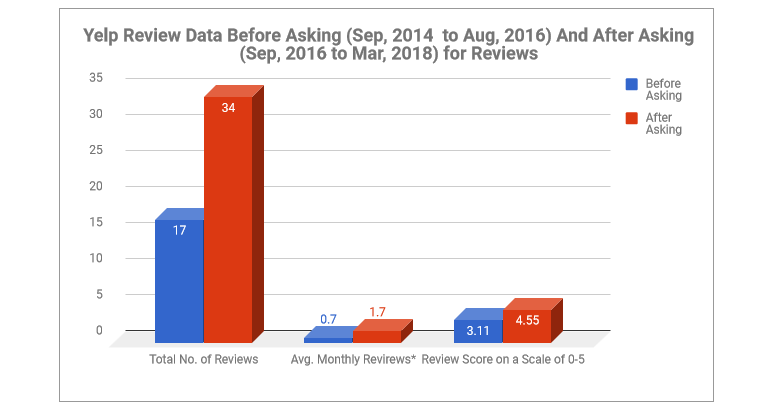
As you can see, for Yelp the total number of reviews increased by a double-fold (from 17 to 34). This caused a substantive increase in the average monthly reviews from 0.7 to 1.78. This was a direct result of our client's updated policy of “asking for reviews” from their patients. However, our main interest was in understanding how our client was performing on the average review score (which is an equivalent of the satisfaction score) front so that we can get a real picture of patient satisfaction. Fortunately, the review scores increased significantly. Previously, when our client wasn't asking for reviews, it was 3.1. After changing their policy, their review scores improved and reached a new height of 4.55 out of 5. This made it clear that the patient satisfaction picture reflected by Yelp (before our client was asking for reviews from their patients) was not consistent with the actual patient satisfaction provided by our client. The actual picture of patient satisfaction appeared only after more number of patients (both happy and unhappy ones) started submitting their reviews. The picture of patient satisfaction was almost same in case of data for Google.
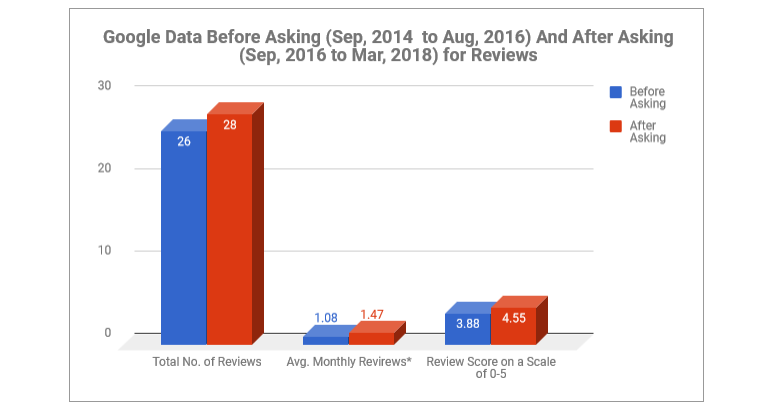
In case of Google reviews for our dental care client, even though the total number of reviews didn't see any major improvement, the average review score still saw a marginal increment from 3.88 to 4.55 out of 5. During an in-depth study of this Google data, we found that the increase in the average review score was because of the increased participation of the happy patients in the review writing process. This happened only after our client had started asking their patients for reviews. Our findings here also correlate with the findings of a Northwestern University study. According to the (NU) study, dissatisfied customers are naturally self-motivated in terms of writing reviews. Their anger leads them to write bad reviews about the service to vent their frustration. This phenomenon gives rise to a naturally occurring negative bias in the overall review picture.
The Need of Online Reputation Management for Dental Care Practices
The findings of the study strongly suggest the need of online reputation management for dental care practices. Managing your online reputation simply means facilitating your patients in review writing process for increasing the number of reviews actually posted on different review platforms so to keep the online average review score (on those sites) from the negative bias. The Northwestern study we talked about earlier also encourages businesses to solicit reviews. The study says that asking for reviews will ensure that your online reviews show a larger, more representative, and more credible population of reviewers. Managing your online reputation will help your dental care practice in many ways:
- Countering the negative review bias on your page
- Increasing the number of positive reviews in the overall review picture online
- Maintaining a positive brand presence and authority online
- Improving search engine rankings for your practice
- Increasing revenue by improving patient acquisition and retention
An Easy Way for Dentists to Identify Review Inconsistency for Their Practice
Dentists can easily check for review inconsistency with their accounts on different review websites with the help of this RepuGen tool. They will need to fill in few simple details only (see the screenshot below), and hit the submit button.
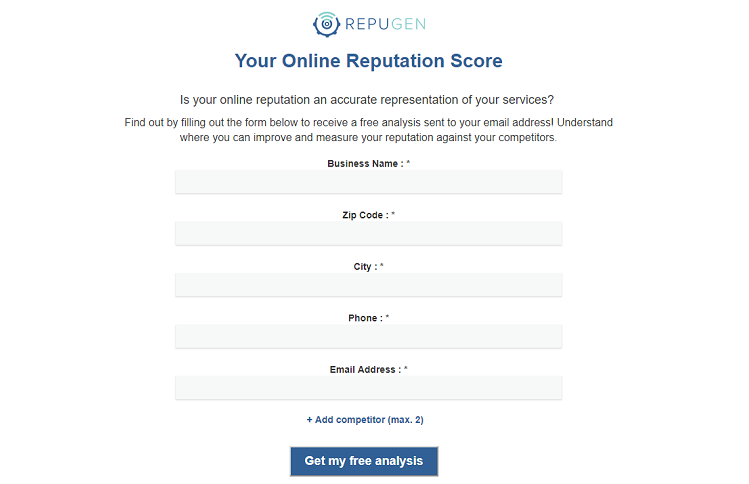
Here's how the results would appear:
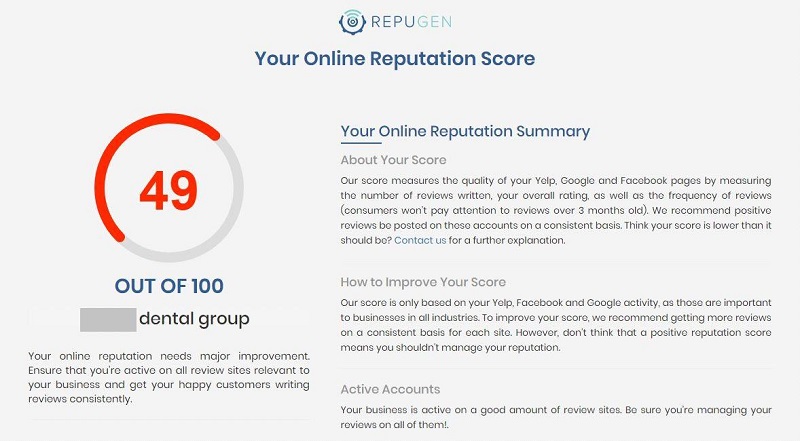
The tool gives a reputation score for your practice on a scale of 0-100. Anything less than 50-60 means a serious chance of inconsistency with your online reviews and the actual patient satisfaction and indicates the need of online reputation management for your practice.
Conclusion
The value of patient reviews will only increase with the increasing importance of patient satisfaction in the modern healthcare delivery model. That's why healthcare practices, including the dental care providers, should understand this and take help of reputation management, so that their online reviews may be able to reflect the unbiased picture of patient satisfaction to their patients.
Comments are closed


